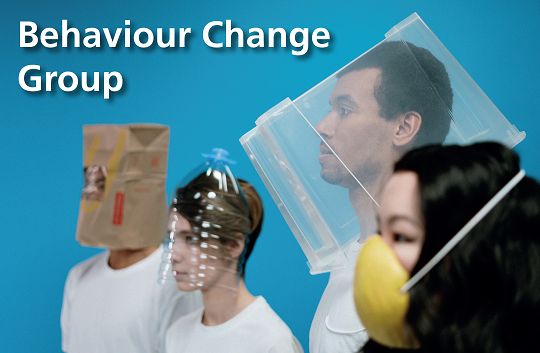Dr Emma Berry, Lecturer in Health Psychology, School of Psychology, Queen’s University Belfast

The Behaviour Change Group (BCG) was established in response to the escalating public health crisis posed by COVID-19. The BCG is chaired/led by Dr Nicola Armstrong (HSC R&D Division) and Dr Janice Bailie (Assistant Director, HSC R&D Division). The BCG comprises Behavioural Scientists, Public Health professionals, and academics with expertise in Health Psychology, Public Health and Medicine, and Computer Science.
Members of the BCG represent a wide range of organisations including the Health and Social Care Research & Development Division (HSC R&D) of the Public Health Agency (PHA), Health Intelligence, Health Improvement, and Health Protection and Communications, Department of Health, NI Innovation Lab, Ulster University, Queen’s University Belfast, and Northern Ireland Public Health Research Network
What does the BCG do?
The collaborative interdisciplinary work undertaken by the BCG is intrinsic to the HSC R&D Division to ensure that public health strategies to reduce the spread of COVID-19 are rooted in the science of health behaviour. The BCG aims to understand how individuals in Northern Ireland can be supported to engage in and maintain transmission prevention behaviour (e.g. social distancing, hand washing, self-isolation) as well as staying mentally well across various contexts including HSC sites, schools and universities, public transport, workplaces, sporting venues and retail environments.
Central to the BCG is the gathering, analysis, interpretation, and application of scientific evidence to influence policy and practice. Projects have focused on exploring PPE wearing behaviour in HSC Trust staff; facilitation of transmission prevention behaviours in the retail sector; supporting transmission prevention behaviour in our schools and universities; exploring public perceptions of contact tracing; a rapid review of factors associated with distancing behaviours; and a scoping review of vaccine hesitancy.
Recent work undertaken by the BCG: social distancing in young people from Northern Ireland
In August 2020, members of the BCG carried out a survey, designed with young people, in response to the need to understand how young people from Northern Ireland aged 16-25 years were experiencing and engaging with social distancing. The majority of respondents were aged 19-22 years, were female (73%) and were students (69%).
Our findings concluded that over half of young people said they frequently social distance when spending time with others outside their household. Factors that made it difficult to social distance more frequently include the influence of peers (60%) and finding it hard to remember (60%) social distancing rules. However, 1 in 9 young people felt worried about transmitting COVID-19 to a family member. Although many respondents felt restricted and lonely, half of respondents felt it was the ‘right thing to do’.
This research suggests that many young people play an active part in reducing the transmission of COVID-19, which counteracts the stigmatizing image of young people in Northern Ireland propelled by social media (e.g. Crawfordsburn Country Park ). Efforts should focus on engaging young people in the consultation and development of guidance. The survey findings were presented at the Joint Public Health Annual Conference 2020 in November: https://research.hscni.net/joint-public-health-annual-conference
The next phase of this research will investigate transmission prevention behaviour in young people, as vaccine rollout continues in early 2021.
Sharing knowledge and the road ahead
The BCG continues to evolve and adapt to address current HSC needs. The BCG has established links with relevant stakeholders to facilitate information and knowledge sharing. This includes sharing information and insights with relevant government departments, the Regulations Team, Chief Medical Officer, Chief Scientific Advisor and communications teams.
In 2021, the BCG will continue to inform strategies to maintain transmission prevention behaviour and will support initiatives to boost vaccine uptake, as the COVID-19 vaccine is rolled out across Northern Ireland.
